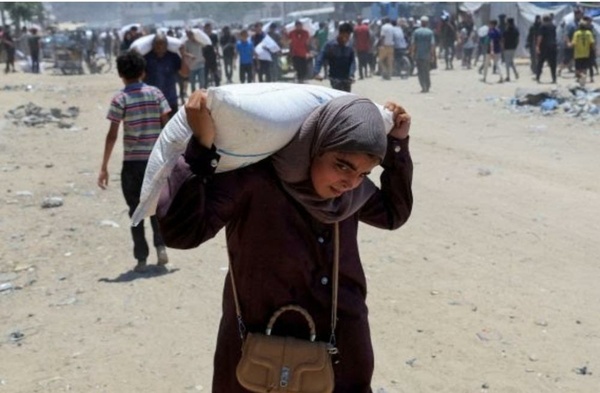
Gaza – Saba:
Umm Zuhair (55 years old) did not know that leaving her house in Jabalia to head to an aid distribution point west of Rafah would be like walking into a "death trap."
Like many women in Gaza, she joined long queues under the scorching sun, hoping to get a handful of flour to feed her starving children, who had gone days without food. Instead of aid, she was met with tear gas, bullets, and kicks.
In the Al-Shakush area west of Rafah, a massive banner read, "Women of Gaza, we are waiting for you." But the reality was entirely different. Umm Zuhair told Safa News Agency: "We found only four aid packages for dozens of women. When we protested the lack of supplies, they sprayed us with pepper gas, then opened fire. One woman was martyred, and others were injured."
The aid distribution point turned into a shooting range, forcing women to run for their lives in what Umm Zuhair described as a "scene from Judgment Day."
Tearfully, she added, "I went out to find food for my children. My husband is blind and cannot provide for us, but I returned with a broken body and spirit."
Since March 2, Israeli occupation forces have imposed a strict blockade on Gaza, preventing the entry of food, medicine, and fuel, exacerbating famine and spreading death among the population, especially women and children.
Umm Ismail (56 years old) also did not escape the horror. She said, "I went to get food for myself and my husband—we have nothing. I never imagined I would be humiliated like this. I returned with a bullet in my left foot."
She stressed that women faced the same verbal and physical violence as men, describing the incident as "systematic humiliation."
According to Gaza’s Health Ministry, the number of "martyrs of sustenance" has reached 1,179, with over 7,957 injured, marking one of the harshest humanitarian crises in the Strip.
What Gaza’s women endure today at aid centers is not just a battle for food but a daily struggle for dignity and survival—amid near-total international indifference to the plight of besieged civilians.
Umm Zuhair (55 years old) did not know that leaving her house in Jabalia to head to an aid distribution point west of Rafah would be like walking into a "death trap."
Like many women in Gaza, she joined long queues under the scorching sun, hoping to get a handful of flour to feed her starving children, who had gone days without food. Instead of aid, she was met with tear gas, bullets, and kicks.
In the Al-Shakush area west of Rafah, a massive banner read, "Women of Gaza, we are waiting for you." But the reality was entirely different. Umm Zuhair told Safa News Agency: "We found only four aid packages for dozens of women. When we protested the lack of supplies, they sprayed us with pepper gas, then opened fire. One woman was martyred, and others were injured."
The aid distribution point turned into a shooting range, forcing women to run for their lives in what Umm Zuhair described as a "scene from Judgment Day."
Tearfully, she added, "I went out to find food for my children. My husband is blind and cannot provide for us, but I returned with a broken body and spirit."
Since March 2, Israeli occupation forces have imposed a strict blockade on Gaza, preventing the entry of food, medicine, and fuel, exacerbating famine and spreading death among the population, especially women and children.
Umm Ismail (56 years old) also did not escape the horror. She said, "I went to get food for myself and my husband—we have nothing. I never imagined I would be humiliated like this. I returned with a bullet in my left foot."
She stressed that women faced the same verbal and physical violence as men, describing the incident as "systematic humiliation."
According to Gaza’s Health Ministry, the number of "martyrs of sustenance" has reached 1,179, with over 7,957 injured, marking one of the harshest humanitarian crises in the Strip.
What Gaza’s women endure today at aid centers is not just a battle for food but a daily struggle for dignity and survival—amid near-total international indifference to the plight of besieged civilians.